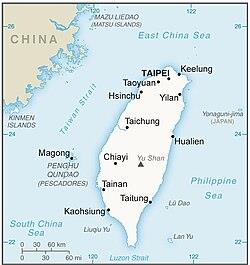
Taiwan To Test Bitcoin As Strategic Asset With Pilot Program

Taiwan is set to begin a pilot program to assess the viability of Bitcoin as a strategic asset, marking a significant shift in the country's approach to digital currencies. The decision, which was approved by both the Prime Minister and Taiwan's central bank, aims to explore the potential of Bitcoin in the country's financial strategy and its application in managing confiscated assets.
The initiative comes at a time when global interest in digital currencies continues to grow, with several nations beginning to integrate Bitcoin and other cryptocurrencies into their economic frameworks. Taiwan's move signals a willingness to experiment with blockchain technology as a tool for financial innovation, despite Bitcoin's volatility and the regulatory challenges that many countries face in adopting such assets.
The Taiwanese government intends to store Bitcoin acquired from confiscated funds within the framework of this pilot. It is part of a broader effort to establish clearer regulations surrounding cryptocurrency and its role in asset management, particularly in relation to funds seized from illegal activities. This initiative could provide insights into how digital assets might be incorporated into the national financial system, paving the way for more widespread adoption in the future.
Taiwan's central bank, which has been cautious in its approach to cryptocurrencies, is now tasked with overseeing the implementation of the pilot program. The bank will also monitor the performance of Bitcoin in this new capacity, assessing whether it offers benefits such as enhanced liquidity and diversification for the country's reserves.
For years, Taiwan has taken a cautious stance on cryptocurrency. While it has not outright banned digital currencies, the country's regulatory framework has largely focused on preventing illicit activities such as money laundering and tax evasion. With this new initiative, however, Taiwan seems ready to take a more proactive role in exploring the potential benefits of blockchain technology for economic management.
See also Cryptocurrencies Rebound as Bitcoin Surges and Global Equities ClimbThe pilot program will run for an undisclosed period, during which the central bank will evaluate the practicality of Bitcoin as a stored asset, with a particular focus on security, value fluctuations, and its ability to integrate with traditional financial systems. Given Bitcoin's known volatility, the central bank will likely take a conservative approach to its management, limiting the amount of cryptocurrency held and closely monitoring market conditions.
Taiwan's move has already drawn attention from both the cryptocurrency industry and global financial analysts. Experts note that the experiment could provide valuable data for other governments considering similar initiatives, particularly in regions with more stable regulatory environments. If successful, it could lead to broader acceptance of Bitcoin as a legitimate financial asset, beyond its current role as a speculative investment.
Despite its growing global presence, Bitcoin remains a controversial asset. Its decentralised nature, combined with its high volatility, makes it a difficult asset for many governments and financial institutions to adopt. However, some see Bitcoin's potential as a hedge against inflation and as an alternative asset class for diversification. Taiwan's decision to explore its use further could have ripple effects throughout the region, especially in markets where digital currencies are seen as disruptive forces.
The pilot program is also expected to address concerns about the security of digital assets. Taiwan's central bank has experience in managing traditional financial reserves, but Bitcoin and other cryptocurrencies present unique challenges in terms of safeguarding against hacking and ensuring secure transactions. As part of the pilot, the government will likely collaborate with blockchain security experts to implement robust safeguards.
See also Bitcoin's Whitepaper Marks 17-Year Financial ShiftThis move also places Taiwan at the forefront of digital currency experimentation in Asia. While countries like Japan and South Korea have made significant strides in integrating cryptocurrencies into their financial systems, Taiwan's initiative to test Bitcoin as a strategic asset is among the first in the region to explore its use as a legitimate part of a national asset portfolio.
Arabian Post – Crypto News Network
Notice an issue? Arabian Post strives to deliver the most accurate and reliable information to its readers. If you believe you have identified an error or inconsistency in this article, please don't hesitate to contact our editorial team at editor[at]thearabianpost[dot]com. We are committed to promptly addressing any concerns and ensuring the highest level of journalistic integrity.
Legal Disclaimer:
MENAFN provides the
information “as is” without warranty of any kind. We do not accept
any responsibility or liability for the accuracy, content, images,
videos, licenses, completeness, legality, or reliability of the information
contained in this article. If you have any complaints or copyright
issues related to this article, kindly contact the provider above.


















Comments
No comment